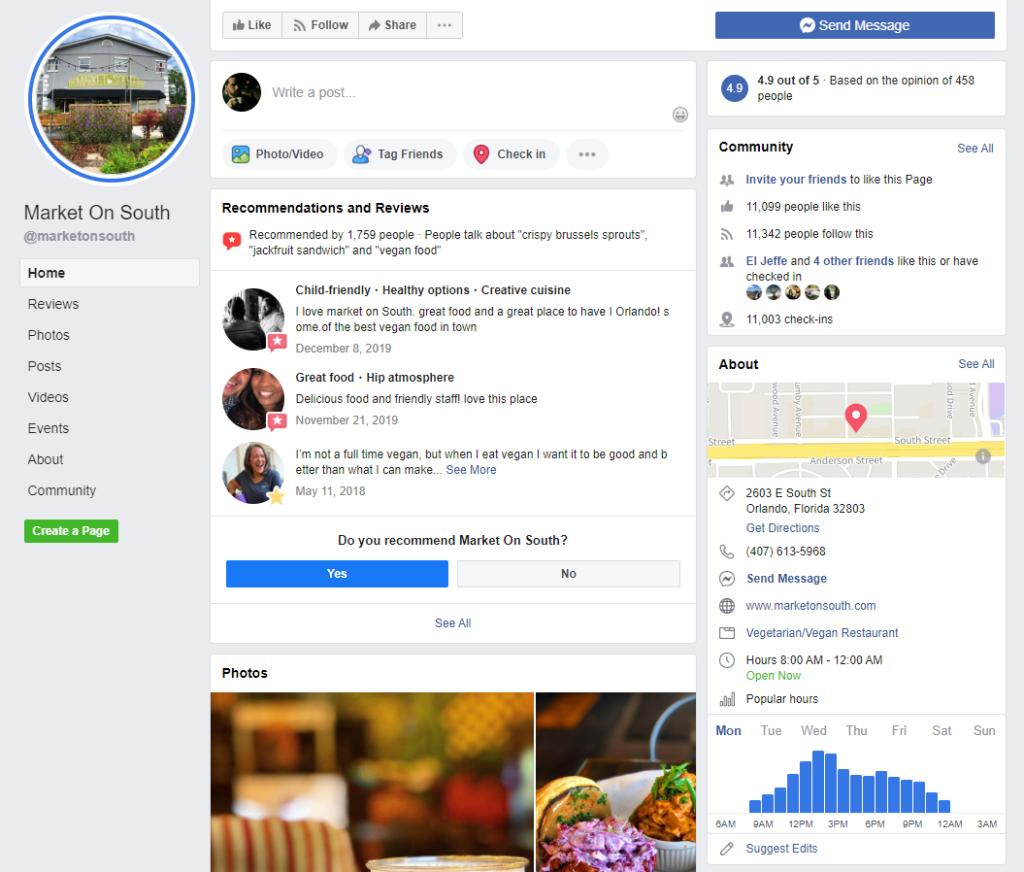
Table of Contents
- What Is Local SEO?
- Importance of Local SEO
- Maximizing Local SEO
- Components of Local SEO
- Beyond the First Level of Local SEO Ranking Signals
- Key Takeaways
- Conclusion
- FAQs
What is Local SEO?
Local SEO is the branch of optimizing your website for specific local area searches you want to appear on search engines. The content, on-page optimizations, link building, etc. are all focused with localized intent.
To give a clear picture, this is what local searches may look like
- Doctors near me
- Grocery shops near me
- Cafes in (city name)
If you have a small to medium-sized business like a shop, restaurant, etc. and you want your website to rank on search engine pages for specific queries by a local audience, you can adopt the Local SEO tips. They make sure that people find you both online and offline. Since most people are also online, looking for things to buy, it makes perfect sense to optimize your online presence for a particular area. Use a local SEO checklist to make sure you follow all of the below suggestions.
Importance of Local SEO
Using local SEO helps your business gain an online presence to attract more business from relevant local searches.
- 46% of all searches in Google have “local intent” (Source: Search Engine Roundtable)
- 29% of all Google SERPs contain a local pack in the results (Source: Rank Ranger)
- 76% of consumers that search for something local on their phone visit a store that day (Source: Google)
The above data proves that a huge chunk of SEO searches are local ones. Therefore, it would be beneficial for your business if you feature in these local searches.
Maximizing Local SEO
What happens when anyone searches for anything on a search engine? It scans through its index and provides the best results for that person’s search. When you optimize your website for local searches, you are letting Google and other search engines know that your business is located in a certain area and can be found by customers in that area.
The easiest and best starting point to optimizing is to update the proper address of your business. This helps you create landing pages, a store locator on your website for people to find your store.
Google uses a different set of ranking factors to rank the local search results. Some key signals are:
- The location that a user is searching from
- Name, Address, and Phone Number (NAP) citations
- Presence of Google My Business account
- Categories used in Google My Business profile
- Online reviews
- Keywords used in online reviews
- Number of “check-ins” at that location
- Social media presence
- Google Maps star rating for that business
We will talk about these key signals in our in-depth local SEO guide below.
Components of Local SEO
Local SEO is not very different from organic SEO – keywords, content, links, on-page SEO, etc. It is just focused locally, on searches people are performing in the immediate area of the business.
The first level of local SEO ranking signals

Want to make sure your business reaches your local audience via the internet? Or do you want to see how your business fairs in a local SEO audit? We have you covered with all the local SEO tips.
Google My Business
This Google My Business SEO tool is one of the simplest and most effective ways to start improving your local SEO.
Categories on Google My Business
Want to know how to do SEO for Google My Business in the most effective manner? Choose the correct categories in Google My Business account. To get the best results, make sure the categories are accurate and few in numbers.
For example, if you are a takeout restaurant, don’t use “dine-in restaurant” as a category.
Photos on Google My Business Page
Upload photos of your location, business, staff, customers. Photos add credibility to your business and help in the ranking game.
Cover other search engines
Google is the most popular search engine, but Yahoo and Bing are other big players in the market. Do not leave them out.
Online citations
Some popular online citations/directories include:
- Apple Maps
- Yellowpages
- Yahoo’s Localworks
While citations aren’t as effective for rankings as they used to be, you do not want to be the only one amongst your competition that has not claimed these listings.
Review sites
What better way to show your credibility than to have people talk good things about you. First, it shows that you are an actual business. Second, it gives people good faith to give you a try.
There are multiple review sites with listings:
Positive reviews
Once you have claimed your review listing, your next step is to make sure that the reviews are positive. Why would a search engine throw the result at a poorly rated and reviewed restaurant?
As per Google, high-quality reviews help improve your business’s visibility.
It is against Google’s review policies to ask for reviews in exchange for something. Other review sites have similar policies.
Keywords and location in reviews
Content always matters. If reviewers use the city or keywords, it sends signals to Google that you are a trusted local business.
Respond to reviews
If you get a review on your business, respond to it. Because it helps your local SEO. Of course, it is not possible to respond to every review (if you are lucky to get way too many of them), but try to respond to as many as you can.
Negative reviews without responses
Now, here’s the deal. Response to a review helps in both cases – positive and negative reviews. If responding to a positive review counts, the search engine is also keeping a tab of all the negative reviews that have no response. A response to a negative review throws the signal that you care.
Facebook business page
Many people use Facebook as a search engine, therefore you should try to score all the local SEO points here that you can.

Create a business page and update it with your website, operational hours, and a description.
Social accounts

A lot of people and a lot of businesses are on social platforms like Twitter, LinkedIn, Instagram. Get on these social platforms, even if you do not have a plan to be much active on these sites. When you ask how to do local SEO marketing, social media is a great place to start.
Since social media is all about speed, people expect a fast response there. Always leave your other contact information if you know you might miss a message or two.
Keep NAP consistent
Make sure your name, address, and phone number are consistent across all the listings – this is one of the best local SEO best practices. Google wants to make sure you are providing accurate information.
Ensuring that your business name, address, and phone number are exactly the same makes it easy for customers to connect with your business when it shows up online.
Mobile sites first
Google now looks at your mobile site first and not your desktop site. Make sure you are on top of this already.
Beyond the First Level of Local SEO Ranking Signals
We just shared the basic local SEO tips with you. Now is the time to move to the next stage – some of the more in-depth local ranking signals.
If you are serious about winning the local SEO game, then this is the right time to tell you the below-mentioned signals are not quick fixes. They require time, strategy, and commitment.
Data markups
Website, Address, Menu, Phone Numbers are some of the data markups. These structured data markups are highly recommended by Google. Several tools in the market can help you to add the markups. You can also check Google’s guide and Google local SEO tips for the same.
Meta titles and descriptions
Yes, local SEO requires a little more than organic SEO, but the basics are the same. If you are doing well in SEO, you will do well in local SEO.

Make sure your meta titles and descriptions make sense, so users find what they expect when they arrive at your site.
Local content
Be consistent in publishing your content and organically including your keywords and location.
Keep in mind what your brands are about and share content accordingly.
Location and keyword optimization
If you provide plumbing services, the keyword ‘plumbing services in (insert city name)’ would work better than just ‘plumbing services’ for local SEO. Right optimization is the key.
Title + Meta Description
Title and meta description are the first of your business that your audience will read. Use your keyword and location in your title and meta descriptions whenever possible.
High-quality inbound links
Just like in SEO, links from sites Google trusts are good for local SEO also. Start building a solid link profile.
Range in inbound links
Trustworthy links are good. What’s even better is a range of relevant and organic links.
Inbound links from locally relevant sites
Links from local news sites, community blogs, and so forth prove that your site is trusted by your neighbors.
Inbound using local + keyword in anchor text
A wide range of inbound links from well-optimized sites is great, but the holy grail is an inbound link from a high authority site using both your city or neighborhood and the main keyword.
Distance from the searcher
You will rank high if you are closer to the searcher. This is why it is important to claim your Google My Business and update NAP that is consistent everywhere.
Website domain authority
Increasing your domain authority isn’t a quick or easy process, but it can pay off handsomely.
Key Takeaways
- Create and optimize your Google My Business account and optimize it by choosing the correct categories, adding pictures, getting reviews, responding to reviews, etc.
- Have a strategy for your website’s content – create relevant content with both local and keywords and make sure your meta descriptions are optimized.
- Find more organic local link opportunities that are trustworthy.
- Get listed on all major review sites and be proactive about responding to them.
- Start using the power of social media to attract the attention of your local audience – create a business profile and be as much active as you can.

Conclusion
The number of businesses is way too many and the competition is at its peak. local SEO is imperative if you want to reach a wider audience in your local community. To do so. You must ensure that your business is found by everyone, everywhere.
FAQs
Yes, local SEO is paid. The cost varies from city to city.
Traditional SEO focuses on improving your business’ visibility in a larger geographical area. Local SEO allows you to be found by people locally.
A lot of local SEO tips are involved for better optimization – create and optimize your Google My Business account and optimize it. You also need a relevant content strategy for your website and social accounts.
There are many benefits for your website from local SEO. It gets you online visibility among local people, old and new. Increased web traffic, leads, and sales from local visitors are some benefits of local SEO. It also helps you decrease advertising costs.
The local SEO specialists are responsible for ensuring that your campaign ranks up across all aspects of local search and third-party listings that occur outside the customer’s website.
Latest Blogs
Explore how Google’s 2025 AI search updates triggered ranking chaos. Learn actionable strategies to adapt your SEO for AI Overviews, zero-click searches, and SERP volatility. Stay ahead now.
Learn how to rank on AI search engines like ChatGPT, Perplexity, and Gemini by optimizing your content for authority, structure, and relevance. Stay ahead in AI-driven search with this strategic guide.
Explore the best healthcare SEO services for your medical practice. Improve online visibility and effectively reach more patients in need of your services.
Get your hands on the latest news!
Similar Posts

Artificial Intelligence
6 mins read
The Role of AI in Digital Marketing: AI Article Generators Transforming Content Creation

Artificial Intelligence
4 mins read
How AI Content Creator Is Shaping the Future of Digital Content

Digital Marketing
3 mins read